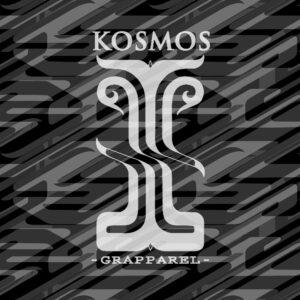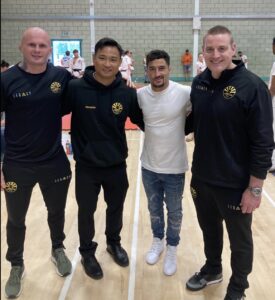
On Saturday 22nd July I attended the Craig Fallon Cup cup and awards do back up in the midlands. Big well done to organisers Gav and Jag for creating and leading both elements of the enjoyable day.
For anyone unaware who Craig Fallon was; Craig was one of Great Britain’s finest ever Judo players, with key career highlights being World Champion in 2005 (one of only 3 British males to do so in the history of the sport), European Champion in 2006 and two times Olympian, competing at both the 2004 and 2008 Games. Craig very sadly took his own life in 2019.
I was lucky to have known Craig, from being a youngster in the midlands to spending time together on the British senior team. I’d certainly not go as far as to say we were the closest of friends but shared a lot of great times and memories. We’d catch up occasionally enough when he’d retired; one time that sticks out was when Craig came in to guest lecture on the European Judo Union course I was a student on in Cambridge, the two of us went out for ‘just a couple of beers’ later that evening which resulted in a 3am chin up contest off of the McDonalds golden arches! Craig won :-l The appreciation of being friends with a bloke I used to have a poster of up on my bedroom door as a kid never really wore off.
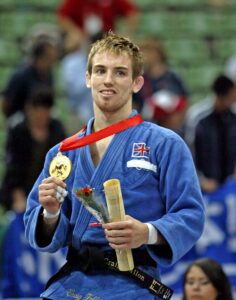
And, although painful to recollect, but I believe vitally important to me now as a coach, I was in somewhat of close proximity to Craig as his career came to a close. Craig had been living and training with us at Camberley for a couple of years. We were roommates at his final major tournament, the 2011 World Championships in Paris. The tournament didn’t go well for Craig, losing in the early rounds. No athlete likes losing but even I, still a naive excitable 22 year old, could see that Craig’s disappointment was ‘lower’ and, that there was a finality regarding his career in how he talked. An uncertainty where to go and what to do next. As a senior Craig was one of the first people that I was closer to that I watched call a day on their career. I so often think back to that 10 days in Paris 12 years ago when I begin to conceptualise the athlete coach relationship and, how to attempt to navigate the often vastly layered psychological journey a competitive sporting career can entail. I was extremely privileged to share in a small number of Craig’s experiences, some great, some not so, but all so very formative.
At the awards evening on Saturday Gavin and Jag (close friends of Craig) did a great job of running through some of the trials and tribulations often faced by athletes; highs and lows of competing, strains of training, sourcing funding etcetera. I also thought Gav did a particularly cracking job of articulating many of the thought processes around one of the big ones, the ‘what’s next’ issue. What will I do when all of this comes to the end?
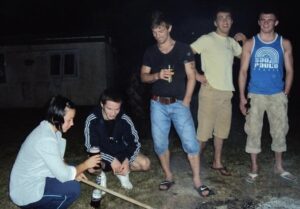
I am a big believer in sharing, particularly experiences. I found it so useful hearing and drawing on people that had been through the full time Judo life; for things in training, lifestyle, tactics and for hope that there can be success and a good and fulfilled life post competing. I have always been an advocate on this blog for the importance of excellent coaching, something known for as long as human beings have competed with each other. As a full time athlete I needed trust and knowledge that the person asking me to do things had done them themselves, felt what I’d felt, made weight, lived on little money, stood in the tunnels, slugged the tough weeks and years out. I also found that incredibly useful upon retiring, I had someone that I could talk to that had again been through the same process. I also find/found a lot of literature, particularly memoirs and self development very useful in that/this transitional period. More shared experiences. So, for what it may, or may not be worth, I’d like to discuss a bit about my own experience of the first eighteen months of being retired from competitive sport.
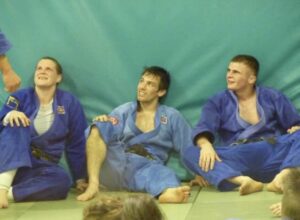
Worth starting with mood I think. It’s largely been a very happy year and a half. I woke up one day and knew that I didn’t want to compete internationally anymore, therefore ceasing to train full time. I’m still very content with that decision and firmly believe my career ran its full course and came to its natural close. I am actually doing some domestic events and gradings currently but with the sole purpose of working through my grades; like many full time players I was only focussed on medals and therefore neglected my grades. I see fighting as a package; the lifestyle, all the prep and the competing. I love training but don’t miss plenty of the elements of the lifestyle and the preparation.
Competition day was always my favourite part; I’ve since learnt that a big piece of that is the “getting let off of the leash” feeling. I love a good ‘buzz’ so will always miss that but I’ve found other ways I can get a good whack of such feeling, some I’ll discuss shortly. Rare but on occasion I still ask myself ‘what’s next?’ As a friend of mine, who has been an engineer since leaving school 25 years ago, is still an engineer, and seems to have taken no great action to not remain an engineer says, “mate, I still don’t know what to do with the rest of my life!” That question isn’t exclusive to athletes, it’s seemingly just part of the human condition.
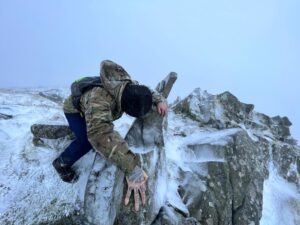
From some of the senior athletes I’ve spent a bit of time with, a couple of them seem to do the typical binge eating post competing; mostly connected to weight making. Upon talking to them I found many of my own older thought processes articulated back to me. I spent my last few years at -73kg asking my self whether I’d ever feel satiated by food again, whether I would ever have a healthy relationship with it. I found doing some events at the higher weight of -81kg, and still maintaining regular training (obvious lower volume- 4x per week initially) upon retiring and eating a lot of similar stuff I did as an athlete but without putting any limit on myself, good to dissipate the more extreme thinking. I seldom ever think like that anymore, which is a great relief.
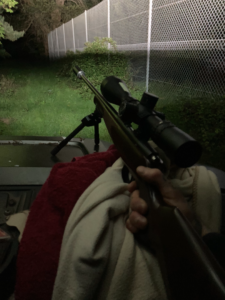
I feel very lucky in that I always knew that I wanted to remain in Judo and coach; therefore at least having somewhat of an answer to, ‘what’s next?’ I know that isn’t everyone’s experience so, although plenty of times I would feel lost, I suppose I never felt fully ‘in the dark’ about what to do next. I had been coaching pretty much throughout my full time training days so already had 13 years or so of experience under my belt so it didn’t really feel like a hard transition. I was again luckier than most in that I had, and still have, great opportunities and support for coaching at Camberley Judo Club.
I gave up drinking alcohol a few years before I retired. I always had a lot of drive and energy but found that it pretty much doubled when I stopped drinking. Hobbies became ever so much more important in my life again. Since retiring from serious Judo competition I’ve been able to make more regular habits of Muay Thai, Brazilian Jiu-Jitsu, fishing, hunting, butchery and more personal writing. I did a year of learning sprinting, and competed! Been doing with some low level mountaineering and beginning some climbing with the scope to hit higher peaks. I still lift weights a couple of times a week and randori (spar) with the full time team as much as I can at Camberley. While I still want to do well with things I try I find that the emotional attachment isn’t there like it was with Judo. It’s quite nice not caring as much and just enjoying things for what they are.
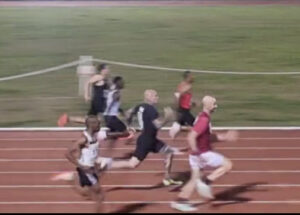
I’ve also started a couple of businesses with friends which I’m finding really stimulating, more info on those to come. I was in debt or near skint through all of my career; I was also no angel with money in the times I had it. Educating myself a bit on finances in the last two years has led me to save a safety pot of money and have some spare to put into those couple of recent business ventures.
I found simply just sitting down and writing a list of anything and everything I fancied or needed to have a bash at and just getting stuck into some of them a good way to start. Some apprehension about looking foolish and wanting the best ways to begin were there initially but, as they say, the best way of starting is just to start. Work things out on the way if required. I was recently gifted a copy of Saul David’s SBS: Silent Warriors, I like Roger Courtney’s (seen as the father of the Special Boat Service) philosophy, “High living, low thinking.”
I found I cannot think myself into an enjoyable retirement.
I have to action one.
Sign up to my newsletter here.

